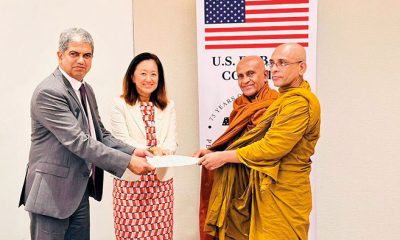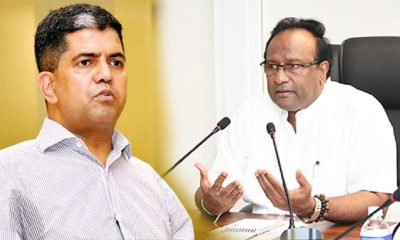News
Global Tamil Forum calls for strong resolution on Lanka
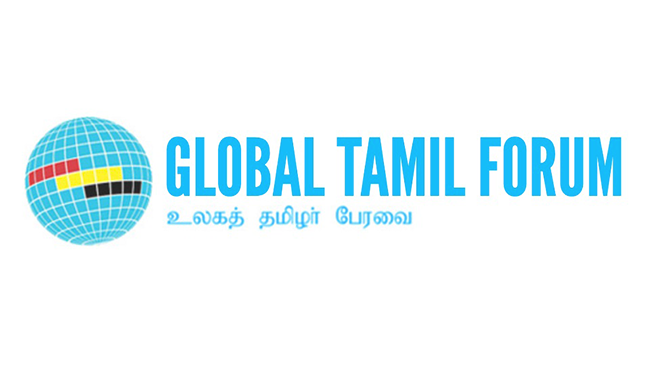
The Global Tamil Forum (GTF) has called for a strong resolution on Sri Lanka at the UN Human Rights Council (UNHRC) in Geneva.Issuing a statement, the GTF said that for the Tamil people who have suffered enormously during the war, and indeed for the victims of human rights violations from all communities who are denied accountability and justice in Sri Lanka, the UNHRC has consistently provided much needed hope.
The role played by the Office of the High Commissioner for Human Rights (OHCHR) is crucial in this regard. GTF expresses its sincere appreciation to Michelle Bachelet for her exemplary service as the High Commissioner till last month and welcomes the new High Commissioner Volker Turk in this important role.
It is clear from the High Commissioner’s report that the unprecedented economic crisis in Sri Lanka has its roots firmly in its long history of unaccountable governance associated with the ethnic conflict and war. The report argues that ‘deepening militarisation and lack of transparency and accountability in governance have embedded impunity for serious human rights violations and created an environment for corruption and the abuse of power.’ For the first time related to Sri Lanka, the UN review recommends ‘investigation of economic crimes that impact on human rights and the tracing and recovery of stolen assets.’
The High Commissioner’s report also recognises the opportunity provided by the economic crisis, to charter a new path spurred by broad-based demand by all communities for deeper reforms and accountability. And the report recommends ‘a more fundamental constitutional reform through broad-based consultative process to strengthen democratic checks and balances and devolution of political authority, which is integral to reconciliation and the full enjoyment of human rights by all members of its population.’
However, the report is highly critical of the hard-line approach taken by the Ranil Wickremesinghe government – including continued usage of the Prevention of Terrorism Act (PTA) to detain student leaders and to continue to detain long-term Tamil and Muslim prisoners, despite years of promises to repeal, and rescinding on the recent commitment to a de facto moratorium on its use. And the report calls to immediately end the reliance on draconian security laws to crack down on peaceful protests, reverse the drift towards militarisation and to show renewed commitment to deliver on security sector reform and ending impunity.
The OHCHR report notes that in 2022, Defence was allocated 373.1 billion rupees (then US$1.86 billion), which accounted for 15 percent of total government expenditure, and this was more than double that allocated for Health. Such high defence expenditure in a country under major financial crisis and that too for defence activities disproportionately concentrated in the North-East where their actions only prevent return to normalcy, defies logic.
GTF would like to emphasise that the genesis (from 2009) and the continuing driver of the UNHRC process have been about addressing accountability for war time atrocities committed during the war and promoting reconciliation among all communities. It is in this aspect the High Commissioner’s report is more scathing. The Easter Bombing (2019) is now part of a long list of emblematic cases where truth seeking has been intentionally made impossible.
The OHCHR report unambiguously states, ‘The Sri Lankan state, through successive governments, has consistently failed to pursue an effective Transitional Justice process to hold perpetrators to account and to uphold victims’ rights to truth, justice, and reparation. Rather, they have created political obstacles to accountability and actively promoted and incorporated some military officials credibly implicated in war crimes in the highest levels of government.’
The report identifies that even the tokenistic initiatives from the government, such as the Office on Missing Persons (OMP), has lost the confidence and trust of the relatives of victims, following a series of problematic appointments to the Chairperson and Commissioners. In effect, the OMP has not been able to trace a single disappeared person or clarified the fate of the disappeared in meaningful ways and it is focussed on expeditiously closing the files and issuing families with ‘Certificates of Absence’.
The High Commissioner’s report calls Sri Lanka to ‘re-launch a comprehensive, victim-centred strategy on Transitional Justice and accountability, to establish credible truth seeking mechanism and ad hoc special court’. This statement is unambiguous in that as per the view of the OHCHR, after 13 years of solemn promises and commitments to its citizens and to the international community, the accountability project within Sri Lanka has reached the dead end.
In reality, Sri Lanka went through many distinct phases in its dealing with war related accountability issues – outright denials initially; followed by half-hearted actions and perceived cooperation through internal investigations and co-sponsorships of UNHRC resolutions; and finally playing for time hoping that the issue will disappear. But it is to the credit of the international community, the core group of countries, the NGOs and the United Nations system that their focus never wavered. In fact, there has been progressive ramping of up of initiatives – Secretary General’s Panel of Experts on Accountability in Sri Lanka (2011); Secretary-General’s Internal Review Panel on United Nations Action in Sri Lanka (2012); OHCHR Investigation on Sri Lanka (2015) and the OHCHR Accountability Project as per the Resolution 46/1, Paragraph 6 (2021).
The High Commissioner’s report states that the OHCHR Accountability Project is fully staffed and operational since May and is focussed on four tracks – “Collecting, consolidating, analysing and preserving information and evidence”; “Developing possible strategies for further accountability processes”; “Advocating for victims and survivors” and “Supporting relevant judicial and other proceedings”. It is pleasing to note that the OHCHR has received requests from national authorities for information and evidence related to eight individuals, as well as a number of alleged violations, and we strongly support High Commissioner’s call for ‘renewing the mandate and reinforcing the capacity of OHCHR for its specialised accountability project’.
It is important to note that that the time has arrived to explore further options for advancing accountability in Sri Lanka. The High Commissioner’s report refers to communications submitted in October and November 2021 to the Prosecutor of the International Criminal Court requesting that the Prosecutor exercise jurisdiction over alleged crimes occurred partially on the territory of States Parties (to the Rome Statute).
The report calls on ‘states to cooperate in accountability efforts, including available avenues of extraterritorial and universal jurisdiction to investigate and prosecute crimes under international law’ and ‘to explore further measures including targeted sanctions, restrictive measures and travel bans in relation to those who are credibly implicated in serious crimes.’
It is in this context the international community needs to view the announcement by the Sri Lankan Foreign Minister Ali Sabri that the Ranil Wickremesinghe government would not agree to any external mechanism and looking for internal truth seeking arrangements within the framework of Sri Lankan constitution. After 13 years of dithering and deceiving, and co-sponsoring resolutions (30/1, 34/1) which called for establishing hybrid court with international participation, that too by a government when Ranil Wickremesinghe was the Prime Minister, Sri Lanka now wants to go back to square one and start all over again. The absurdity of this proposition will not be lost on any keen observer of Sri Lanka.
We also thank India for comments during the Interactive Dialogue on Sri Lanka: Indian delegation notes with concern the lack of measurable progress by Government of Sri Lanka on their commitments of a political solution to the ethnic issue — through full implementation of the 13th Amendment of the Constitution, delegation of powers to Provincial Councils and holding of Provincial Council elections at the earliest. The HRC process should facilitate devolution of political authority to the North and East provinces building up on the 13th Amendment and finding a lasting political solution to ensure non-recurrence of the violent past.
GTF is of the view that Sri Lanka is at crossroads. The nascent transformation Sri Lanka presently undergoing is significant and there is a developing environment where an unaccountable government will be under increased scrutiny. In addition to wartime accountability, legal, financial, and other governance accountabilities are also under intense focus. Unfortunately, many of the recent actions by the Ranil Wickremasinghe government are not conducive to promote this healthy development. Irrespective of that, this emerging trend needs to be conscientiously promoted by the international community, which is possible only by adopting a well-targeted UNHRC resolution. The new resolution needs to build on the key aspects of the March 2021 UNHRC resolution (A/HRC/RES/46/1) and mirror the comprehensive set of recommendations listed in the High Commissioner’s reports of February and September 2022. GTF is of the view that the reports mandated in the proposed resolution should be transmitted to all relevant United Nations Bodies and the Secretary-General for appropriate action.
The GTF also fully endorsed the request by Human Rights Watch and 3 other NGOs calling the HRC to adopt a Resolution that: Strengthens the mandate for monitoring and reporting, by establishing an expert mechanism to monitor and report (both to the Human Rights Council and the General Assembly) on the current rights situation in Sri Lanka and make concrete recommendations to ensure the protection and realization of rights. It is also the responsibility of the Member States including the Core Group of Sri Lanka to adequately fund the increased scope and capacity of the Sri Lanka Accountability Project throughout the new period envisaged in the Resolution.
News
AKD warns of far reaching economic consequences of Middle East war
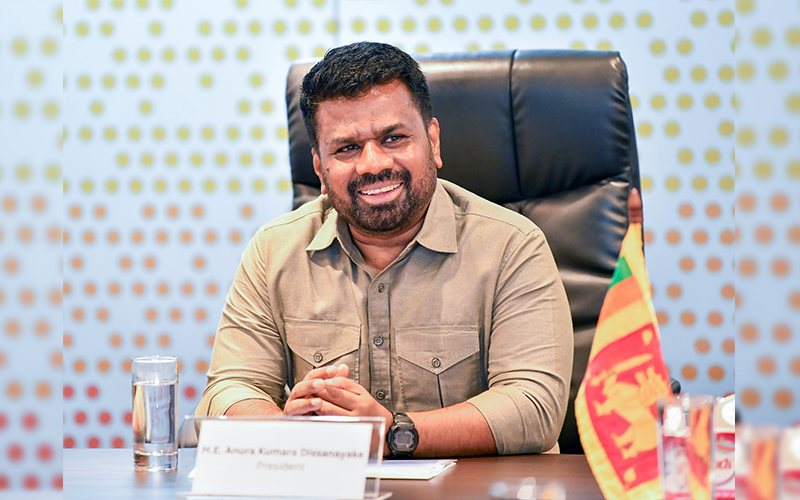
President Anura Kumara Dissanayake yesterday called for an immediate and peaceful resolution of the escalating Middle East conflict, warning that the crisis could have far-reaching repercussions on the global economy, including Sri Lanka.
Addressing Parliament, the President stressed that no military conflict benefited humanity, particularly at a time when destructive military technologies were rapidly advancing.
“Any military conflict does not create a favourable situation for any group of people,” he said, urging all parties to make urgent commitments towards peace. “As Sri Lanka, our position is that all parties involved in this war must, as soon as possible, take steps toward a peaceful world.”
He cautioned that Sri Lanka could not remain insulated from the fallout from the conflict, noting that disruptions to global oil and gas supplies, threats to migrant workers in the Middle East, and potential shocks to tourism, remittances, shipping and aviation were real concerns.
A national programme was being formulated to mitigate the impact, he said, adding that its success would hinge on broader international efforts to restore stability, the President said.
Acknowledging public anxiety shaped by past economic hardships, President Dissanayake said social stability could not be ensured through rhetoric alone but required tangible guarantees that citizens would not face another crisis.
While noting that the government had successfully navigated multiple challenges since assuming office, he described the Middle East situation as distinct due to the uncertainty surrounding its duration and outcome.
The government, he said, was closely monitoring developments. The Central Bank had conducted a review with a report on the likely economic impact expected shortly. The Ministry of Finance is also preparing an assessment of the potential effects on public life, alongside measures to ensure the uninterrupted provision of essential services locally and for Sri Lankans overseas.
“The primary responsibility for finding a path out of the crisis rests with the Government,” he said, calling on Parliament and the public to collectively confront the challenge under a unified national plan.
Providing a detailed account of the country’s energy reserves, the President said storage capacity rather than supply remained the key constraint. Excluding the Indian Oil Corporation tanks in Trincomalee, total storage capacity at Kolonnawa and Muthurajawela stands at approximately 150,000 metric tons.
Diesel stocks were currently sufficient for 33 days, with refining contributing around 1,800 metric tons daily. Petrol reserves will last 27 days, with a 35,000 metric ton shipment due on March 7 or 8 expected to extend availability to around 40 days.
Aviation fuel stocks are adequate for 49 days, supported by both daily refining and imports. Scheduled shipments include vessels from RM Parks on March 14, Sinopec on March 17, IOC on March 21 and the Ceylon Petroleum Corporation on March 28.
Crude oil supplies were sufficient to operate the refinery for 26 days, with an additional shipment expected to extend operations by a further 18 days, the President said.
“Because of this, there is no crisis regarding oil,” the President assured Parliament.
News
Pope invited to visit Sri Lanka
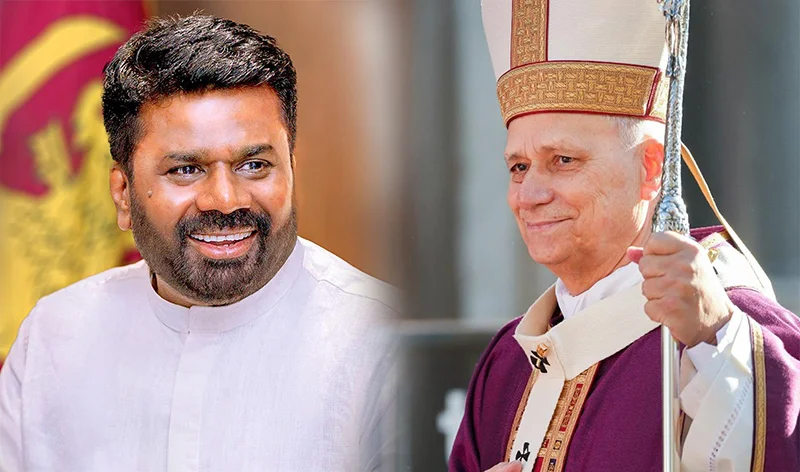
President Anura Kumara Dissanayake has invited His Holiness Pope Leo XIV to visit Sri Lanka.
The official invitation was handed over by Minister Bimal Ratnayaka to the Vatican’s Under Secretary for Relations with the States, at the Vatican, yesterday, during the Minister’s official visit to Italy, the President’s Media Division said.
News
New Tourism Act to strengthen legal action against visa violators
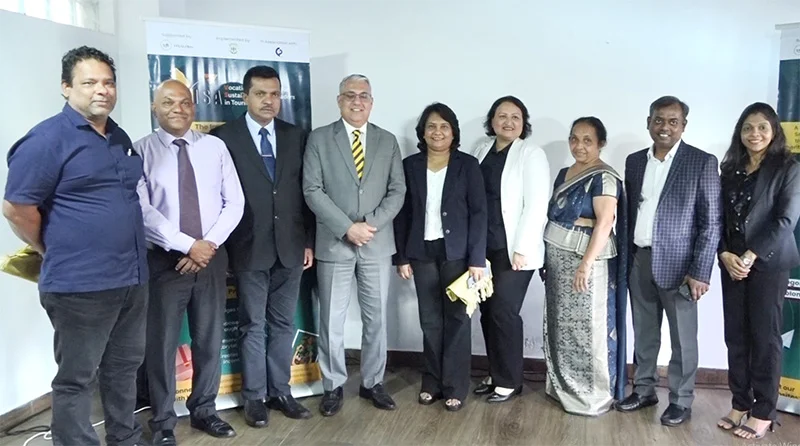
The government is in the process of drafting a new Tourism Act to address legal loopholes that currently prevent the prosecution of foreign nationals who engage in unauthorised activities while on tourist visas. Speaking at a certificate awarding ceremony for the Vocational Initiative for Sustainable Ambassadors in Tourism (VISA) project at the Royal Kandyan Hotel, Suranjith Wavita, a member of the Presidential Task Force for Tourism Development, stated that the current Tourism Act No. 38 of 2005 was flawed as it does not prescribe specific punishments, beyond deportation, for such offenders.
Wavita highlighted that a significant number of foreigners, including Chinese nationals, had been deported over the past three months for working as illegal tour guides and engaging in various trading activities. He explained that due to a shortage of Chinese-speaking local guides, travel agents often brought in “Tour Leaders” from abroad on tourist visas, which was a serious violation. The proposed new legislation aimed to empower the Tourist Police Division to arrest and produce such violators, ensuring stricter enforcement than mere deportation.
The new Act is being formulated by a committee of experts, based on various proposals and ideas to make it mandatory for anyone involved in the tourism industry to be registered and properly trained. To facilitate this, the government has already lowered the basic qualifications required for registration, allowing more locals to enter the profession legally and prevent the negative impact of unauthorised operators on the industry’s future.
Discussing the industry’s growth, Wavita noted that Sri Lanka was now aiming for an annual target of three million foreign tourists. He specifically mentioned the success of the 311-km “Pekoe Trail” in the central highlands, which attracts around 500 tourists daily and helps channel tourism income into plantation-based communities.
He also emphasised the importance of environmental protection, noting that since 25% of Sri Lanka’s flora is endemic, some foreigners enter the country with the intention of “biopiracy,” making the role of trained local guides crucial in safeguarding natural resources.
The VISA training project was implemented by the National Cleaner Production Centre (NCPC) and ASSIST, with the support of VFS Global. The event saw the participation of high-ranking officials, including Manpreet Singh Aurora (Senior General Manager, VFS Global), H.C.P. Jayaweera (Director General of National Botanical Gardens), and Samantha Kumarasena (CEO, NCPC).
Wavita concluded by praising the increasing participation of women in the tourism sector, describing it as a vital contribution to both the industry’s progress and the national economy.
By S.K. Samaranayake
-

 Opinion5 days ago
Opinion5 days agoJamming and re-setting the world: What is the role of Donald Trump?
-

 Features5 days ago
Features5 days agoAn innocent bystander or a passive onlooker?
-

 Features2 days ago
Features2 days agoBrilliant Navy officer no more
-

 Features6 days ago
Features6 days agoRatmalana Airport: The Truth, The Whole Truth, And Nothing But The Truth
-

 Opinion2 days ago
Opinion2 days agoSri Lanka – world’s worst facilities for cricket fans
-

 Business6 days ago
Business6 days agoIRCSL transforms Sri Lanka’s insurance industry with first-ever Centralized Insurance Data Repository
-

 Business5 days ago
Business5 days agoAn efficacious strategy to boost exports of Sri Lanka in medium term
-

 Features3 days ago
Features3 days agoOverseas visits to drum up foreign assistance for Sri Lanka


